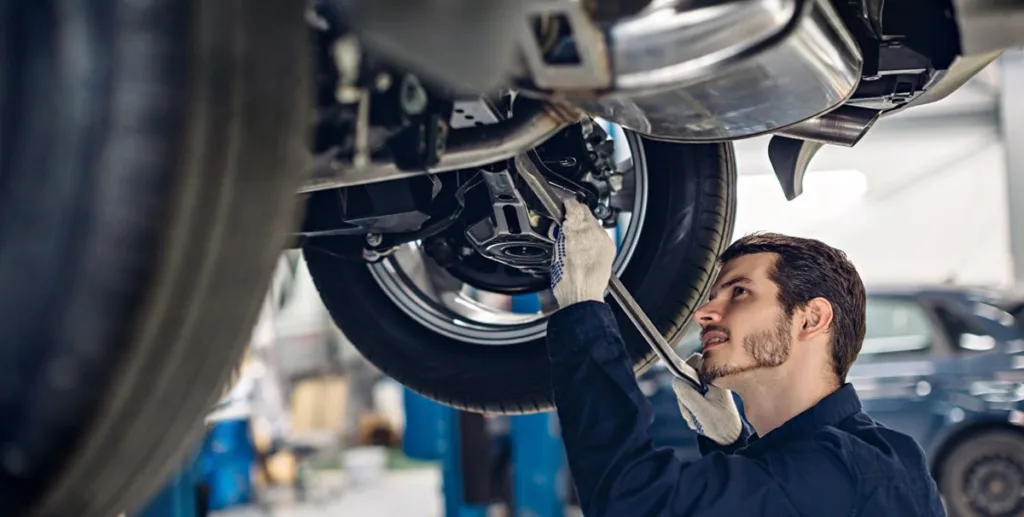All Categories
Featured
Your vehicle's engine is one of one of the most intricate systems in your cars and truck, and every element plays a crucial duty in guaranteeing it runs efficiently. Amongst these, the timing belt is one of the most crucial yet typically neglected parts of your engine. Responsible for integrating the rotation of the crankshaft and camshaft, the timing belt makes sure the engine's shutoffs close and open at the right times throughout the burning procedure. If the timing belt fails, it can result in extreme engine damage. Right here's why timing belt substitute is vital for your automobile's efficiency and long life.
What Is a Timing Belt? The timing belt is a long, toothed rubber or composite belt that links the crankshaft to the camshaft(s) in an inner burning engine. Its work is to maintain the engine's shutoffs and pistons in sync, making certain the engine runs effectively. The timing belt likewise manages other important engine features like the water pump and the power steering pump, relying on the vehicle.
![]()
Without the proper timing, the engine's pistons and shutoffs can collide, causing costly and extensive damages. As a result, changing the timing belt on time is just one of the most effective means to guarantee your engine runs at its ideal and protect against expensive fixings.
Why Timing Belt Substitute Issues. Protecting Against Catastrophic Engine Damages: The most significant risk of not changing a worn timing belt is engine failing. Changing the timing belt at the advised intervals is the finest means to stop such catastrophic damage, saving you from the anxiety and high cost of engine repair work or replacement.
![]()
Maintaining Engine Efficiency: A timing belt that's in good condition guarantees that all engine components work in best consistency. If the timing belt is worn or stretched, it can create the engine to lose power, experience rough idling, or struggle to start. By replacing the timing belt routinely, you can maintain your engine going for peak effectiveness, which assists keep ideal gas economic climate and performance.
Preventing Unexpected Breakdowns: A broken timing belt can cause your engine to stop quickly, potentially leaving you stranded in the middle of a journey. By changing your timing belt on time, you decrease the danger of unexpected breakdowns that can leave you in a inconvenient or harmful scenario. Routine maintenance lowers the chances of experiencing these sort of disturbances, assisting you remain on the road much longer without worrying about your engine stopping working.
Affordable Upkeep: Timing belt substitute is much less costly than repairing or replacing an engine that's been harmed due to a timing belt failure. While the cost of changing the timing belt may differ relying on your vehicle and its place, it is much more affordable than the prices related to major engine repairs or replacements. Replacing your timing belt at the recommended intervals can save you a significant quantity of money over the long term by stopping damages to your engine.
When Should You Replace Your Timing Belt? The timing belt does not last permanently, and the majority of manufacturers suggest replacing it between 60,000 and 100,000 miles. The specific timing depends on your lorry's make, design, and driving conditions, so it's necessary to examine your owner's guidebook for particular guidance.
Indicators that your timing belt may need interest consist of uncommon engine noises (such as a piercing whining or ticking sound), trouble starting the engine, or a reduction in engine efficiency. If you observe any one of these indicators, it's vital to have the timing belt checked by a specialist auto mechanic.
![]()
Verdict. The timing belt is a small however crucial element of your engine, and normal substitute is vital to preserving your vehicle's performance and avoiding pricey damages. By remaining on top of timing belt upkeep, you'll ensure your engine operates efficiently, avoid unforeseen breakdowns, and secure your automobile from significant repair services. Watch on your automobile's recommended timing belt replacement routine, and constantly seek advice from with a trusted mechanic to maintain your engine running smoothly for many years ahead.
What Is a Timing Belt? The timing belt is a long, toothed rubber or composite belt that links the crankshaft to the camshaft(s) in an inner burning engine. Its work is to maintain the engine's shutoffs and pistons in sync, making certain the engine runs effectively. The timing belt likewise manages other important engine features like the water pump and the power steering pump, relying on the vehicle.

Without the proper timing, the engine's pistons and shutoffs can collide, causing costly and extensive damages. As a result, changing the timing belt on time is just one of the most effective means to guarantee your engine runs at its ideal and protect against expensive fixings.
Why Timing Belt Substitute Issues. Protecting Against Catastrophic Engine Damages: The most significant risk of not changing a worn timing belt is engine failing. Changing the timing belt at the advised intervals is the finest means to stop such catastrophic damage, saving you from the anxiety and high cost of engine repair work or replacement.

Maintaining Engine Efficiency: A timing belt that's in good condition guarantees that all engine components work in best consistency. If the timing belt is worn or stretched, it can create the engine to lose power, experience rough idling, or struggle to start. By replacing the timing belt routinely, you can maintain your engine going for peak effectiveness, which assists keep ideal gas economic climate and performance.
Preventing Unexpected Breakdowns: A broken timing belt can cause your engine to stop quickly, potentially leaving you stranded in the middle of a journey. By changing your timing belt on time, you decrease the danger of unexpected breakdowns that can leave you in a inconvenient or harmful scenario. Routine maintenance lowers the chances of experiencing these sort of disturbances, assisting you remain on the road much longer without worrying about your engine stopping working.
Affordable Upkeep: Timing belt substitute is much less costly than repairing or replacing an engine that's been harmed due to a timing belt failure. While the cost of changing the timing belt may differ relying on your vehicle and its place, it is much more affordable than the prices related to major engine repairs or replacements. Replacing your timing belt at the recommended intervals can save you a significant quantity of money over the long term by stopping damages to your engine.
When Should You Replace Your Timing Belt? The timing belt does not last permanently, and the majority of manufacturers suggest replacing it between 60,000 and 100,000 miles. The specific timing depends on your lorry's make, design, and driving conditions, so it's necessary to examine your owner's guidebook for particular guidance.
Indicators that your timing belt may need interest consist of uncommon engine noises (such as a piercing whining or ticking sound), trouble starting the engine, or a reduction in engine efficiency. If you observe any one of these indicators, it's vital to have the timing belt checked by a specialist auto mechanic.

Verdict. The timing belt is a small however crucial element of your engine, and normal substitute is vital to preserving your vehicle's performance and avoiding pricey damages. By remaining on top of timing belt upkeep, you'll ensure your engine operates efficiently, avoid unforeseen breakdowns, and secure your automobile from significant repair services. Watch on your automobile's recommended timing belt replacement routine, and constantly seek advice from with a trusted mechanic to maintain your engine running smoothly for many years ahead.
Latest Posts
Uncover the Best Auto Repair Deals in Montclare, Chicago
Published May 27, 25
1 min read
How to Know When Your Car Needs Skilled Auto Repair at Montclare Auto Repair
Published May 27, 25
1 min read
The Benefits of Regular Car Maintenance at Montclare Auto Repair Reduces Costs
Published May 22, 25
1 min read
More
Latest Posts
Uncover the Best Auto Repair Deals in Montclare, Chicago
Published May 27, 25
1 min read
How to Know When Your Car Needs Skilled Auto Repair at Montclare Auto Repair
Published May 27, 25
1 min read
The Benefits of Regular Car Maintenance at Montclare Auto Repair Reduces Costs
Published May 22, 25
1 min read